In today’s fast-paced business environment, companies are always on the lookout for ways to stay ahead of the curve. One strategy that has gained widespread popularity is outsourcing certain operations to specialized service providers. Known as Business Process Outsourcing (BPO), this method allows businesses to concentrate on their main tasks while experts handle other duties.
Table of Contents
BPO services have become essential for numerous organizations, offering efficiency, cost reductions, and access to worldwide talent. From customer support to human resources and back-office functions, BPO firms are prepared to manage various activities. This support enables businesses to excel in a competitive landscape. We will further examine the roles of BPO services, their importance, and their impact on the future of work.
What are BPO Services?
Business Process Outsourcing (BPO) services are about hiring other companies for specific tasks. This strategy helps businesses focus on their strengths by entrusting other tasks to specialists. BPO services span various areas like customer support, accounting, HR, and digital marketing. Their aim is to enhance efficiency, reduce expenses, and utilize external expertise.

BPO splits into two key types:
- Back-Office BPO: This type deals with internal tasks such as billing, data entry, and HR.
- Front-Office BPO: This focuses on customer-facing services like support, telemarketing, and sales.
Businesses choose BPO for many reasons. These include lowering operating costs, improving service quality, leveraging new technology, and scaling operations swiftly. BPO partnerships can also provide businesses with a competitive advantage, allowing them to adapt quickly and effectively to market dynamics.
Types of BPO Services Offered
The Business Process Outsourcing (BPO) sector has seen remarkable growth, evolving to cater to the multifaceted demands of companies from various industries. This expansion has led to the emergence of a wide array of BPO services, each aimed at bolstering different facets of business operations. Below, we explore the principal categories of BPO services that are currently available:
Customer Support Services
These services provide continuous assistance via multiple communication avenues, including telephone, email, live chat, and social media platforms. They play a crucial role in resolving customer queries, addressing grievances, and collecting valuable feedback.
Finance and Accounting
This category encompasses the management of crucial financial tasks such as bookkeeping, the issuance of invoices, payroll management, preparation for taxes, and the compilation of financial reports.
Human Resources (HR)
HR services are integral for managing employee-related processes. These include recruiting, conducting training, managing employee records, processing payrolls, administering benefits, and ensuring compliance with employment laws.
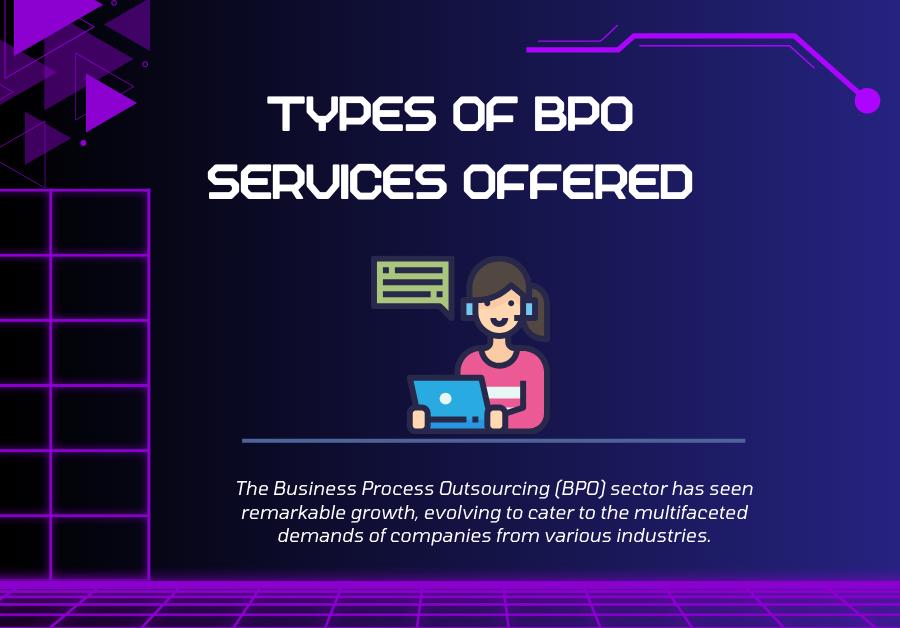
Information Technology (IT) Services
IT services offer support in technology management, encompassing network administration, software development, maintenance, and cybersecurity measures.
Sales and Marketing
These services aid in the cultivation of leads, the acquisition of new customers, the orchestration of digital marketing initiatives, the management of social media presence, and the execution of market research.
Legal Process Outsourcing (LPO)
LPO services provide assistance with legal tasks. This includes managing documents, conducting legal research, managing contracts, and supporting compliance efforts.
Knowledge Process Outsourcing (KPO)
KPO services deal with more complex tasks that require high-level analytical and technical capabilities, such as conducting market research, performing business analysis, and analyzing data.
Each service type within the BPO sector is tailored to optimize particular business processes, enabling organizations to access external expertise and technology. This, in turn, fosters enhanced efficiency, cost reduction, and elevated levels of customer satisfaction.
Importance of BPO Services in Business
The integration of Business Process Outsourcing (BPO) services is a key factor in the strategic evolution of companies across various sectors. Here’s a closer look at why BPO services are indispensable:
- Cost Efficiency: BPO allows organizations to significantly lower operational expenses. Outsourcing tasks not central to their main business enables companies to save on costs related to staffing, training, and infrastructure.
- Enhanced Focus: Companies can direct their attention toward their main goals and areas of expertise by outsourcing. This sharpened focus boosts productivity and fosters innovation, keeping businesses competitive.
- Global Talent Access: BPO providers connect businesses with a wide array of skilled professionals worldwide. This access enriches companies with fresh insights and capabilities, leading to superior outcomes.
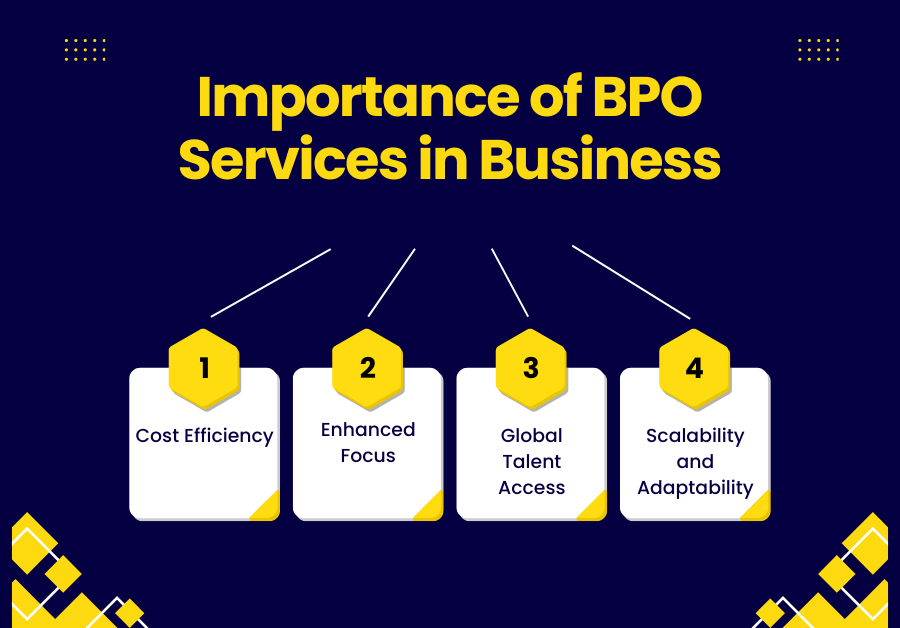
- Scalability and Adaptability: With BPO, companies can adjust their scale of operations swiftly and efficiently, responding to market changes and opportunities without the usual limitations.
- Quality of Service: Expert providers deliver specialized services, elevating service quality. This excellence can increase customer satisfaction and loyalty.
- Risk Distribution: Outsourcing can distribute risks, particularly in areas like compliance and data management. BPO firms are often more adept at navigating regulatory shifts and securing data, easing the load on the primary company.
- Technological Edge: BPO entities invest in modern technologies and methods, granting their clients access to these advancements without significant investment. This enables businesses to employ the latest solutions for operational improvement.
BPO services contribute significantly to the operational effectiveness, strategic growth, and overall success of companies in the fast-paced global market.
The Role of Technology in BPO
Technology is pivotal in the growth and effectiveness of Business Process Outsourcing (BPO) services. As technology evolves, BPO providers utilize advanced tools. These innovations enhance services, streamline workflows, and ensure high-quality service to clients. Let’s explore the key technologies influencing the BPO industry:
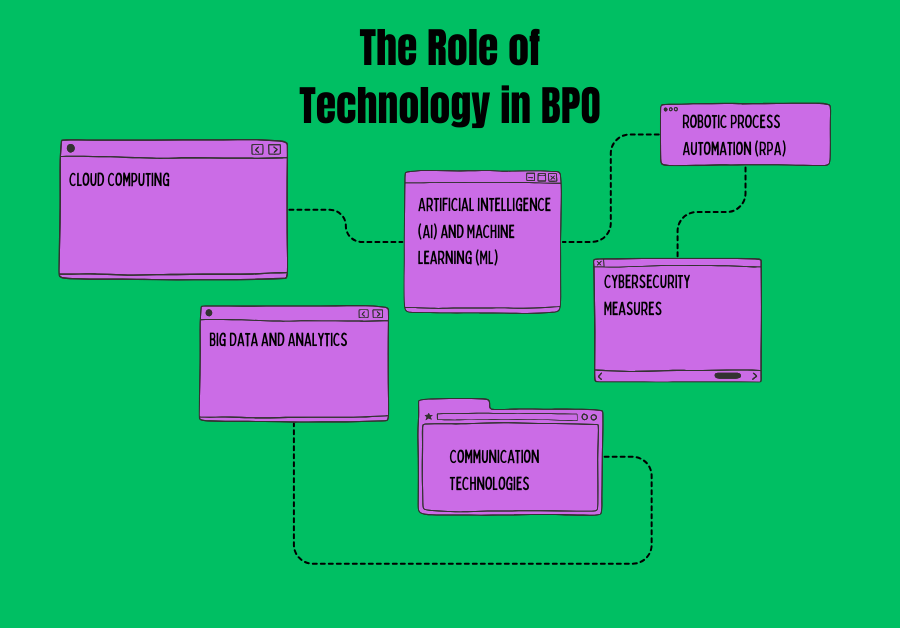
Cloud Computing: This technology has transformed the BPO sector. It offers scalable and cost-effective solutions. Cloud computing facilitates collaboration and allows access to data and services from any location. This adaptability helps BPO firms meet client demands more effectively.
Artificial Intelligence (AI) and Machine Learning (ML): AI and ML are changing BPO services. They automate routine tasks and provide predictive analytics for smarter decision-making. These technologies enhance efficiency and the customer experience.
Robotic Process Automation (RPA): RPA automates repetitive tasks. This reduces the time and cost of these processes. It increases efficiency and frees up employees for more complex tasks.
Big Data and Analytics: BPO firms use big data to understand customer behavior and market trends. This approach helps them make informed decisions, customize services, and discover new opportunities.
Cybersecurity Measures: The growing data handled by BPO firms makes cybersecurity essential. Techniques like encryption and continuous monitoring protect against cyber threats.
Communication Technologies: Modern communication tools improve interactions between BPO firms, their clients, and customers. Tools such as VoIP, live chat, and social media platforms ensure effective communication.
Incorporating these technologies into BPO services boosts operational capabilities. It also offers a competitive advantage by fostering innovation, enhancing service delivery, and securing customer satisfaction in a digital age.
Factors to Consider When Choosing a BPO Provider
Selecting the right Business Process Outsourcing (BPO) provider is crucial for your outsourcing strategy’s success. The choice impacts operational efficiency, cost savings, and customer satisfaction. Consider these essential factors when choosing a BPO provider:
Expertise and Experience: Seek a provider with a solid track record in your industry or the specific service you need. Experience translates to a better grasp of your sector’s challenges and opportunities.
Quality of Service: Evaluate the provider’s dedication to quality through certifications, client testimonials, and service level agreements (SLAs). These outline performance standards.
Technology and Infrastructure: The provider should use current technology and have strong infrastructure. This is vital for service efficiency, reliability, and security.
Cost-Effectiveness: Cost reduction is a key outsourcing goal, but assess the overall value, not just the price. The cheapest option may not offer the best long-term value.
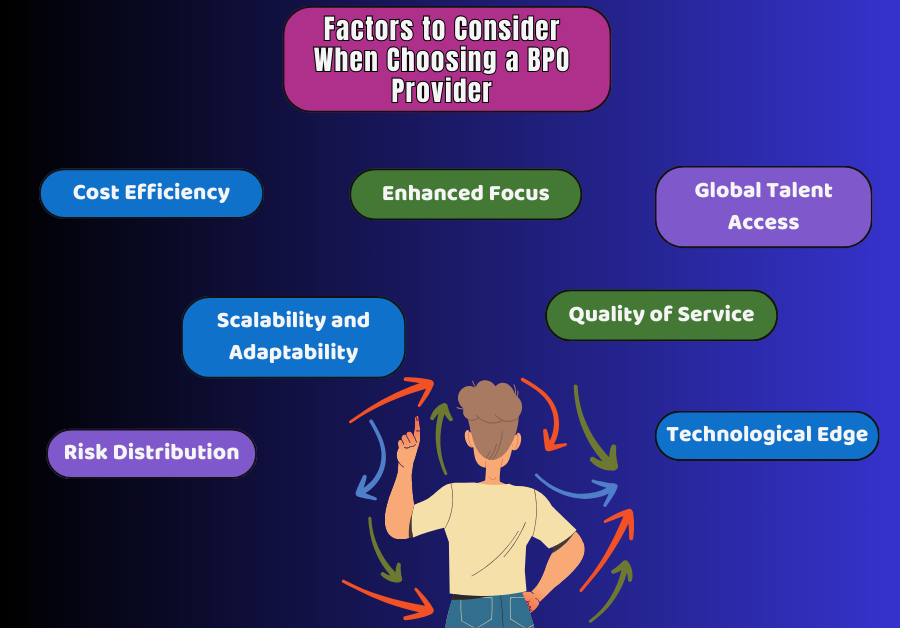
Data Security and Privacy: Strong data security measures are essential. Verify compliance with international data protection regulations.
Flexibility and Scalability: Your provider should adjust services based on your business needs. Look for a provider that can scale services to match changing requirements.
Communication and Language Capabilities: Effective communication is crucial. Ensure the provider has staff with strong communication skills and language proficiency for your customers.
Cultural Compatibility: The provider’s culture should match yours, especially in customer interactions. Shared values and customer service philosophy enhance the partnership.
Location: Consider time zones, geopolitical stability, and cultural affinity for customer-facing services. Location can be a significant factor.
References and Reviews: Seek feedback from the provider’s current and past clients. This offers insights into their strengths, weaknesses, and the overall partnership experience.
Evaluating potential BPO providers carefully on these factors ensures a successful partnership that benefits your business.
Challenges of Using BPO Services
Outsourcing to Business Process Outsourcing (BPO) providers brings benefits. Yet, it also poses several challenges. Understanding and strategic planning can mitigate these issues for a smooth partnership. Here are common challenges with BPO services:
Communication Gaps: Differences in time zones, language, and culture can cause misunderstandings. Strategies for regular, clear communication are vital to overcome these barriers.
Quality Control: Keeping the service quality high can be tough. It’s crucial to set clear expectations and metrics from the start.
Data Security Risks: Giving sensitive data to a third party raises the risk of breaches and privacy issues. It’s necessary to do thorough checks and pick providers with strong security measures.
Loss of Control: Outsourcing might feel like losing control over business processes. A governance model with regular updates and reviews can help keep oversight.
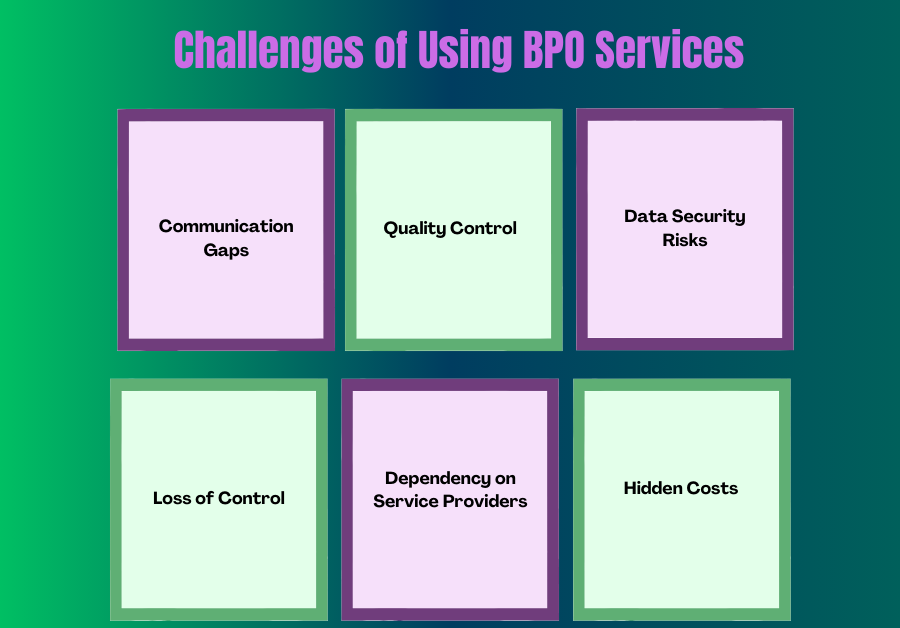
Dependency on Service Providers: Relying too much on BPO providers can be risky if they face challenges or the contract terms become less favorable. Contingency plans and considering multi-sourcing can reduce this risk.
Hidden Costs: Unexpected costs like transition expenses, legal fees, or penalties for not meeting SLAs can occur. Careful contract management is essential.
Impact on Employee Morale: Outsourcing can sometimes be seen negatively by staff, fearing job loss or feeling undervalued. Transparent communication and involving employees in the transition can alleviate these concerns.
Regulatory Compliance: Making sure the BPO provider follows all laws and regulations, especially in different jurisdictions, can be complex. Compliance is crucial in the selection process.
Despite these challenges, many businesses successfully use BPO services to improve their operations and competitiveness. Proactively addressing potential issues and choosing the right partner are key to making the most of outsourcing.
The Future of the BPO Industry
The Business Process Outsourcing (BPO) industry stands on the brink of significant change. Innovations in technology, shifts in business models, and new demands from the market are steering this sector into uncharted territories. Let’s delve into the anticipated trends and shifts in the BPO landscape:
Increased Adoption of Automation and AI: Artificial Intelligence (AI), Robotic Process Automation (RPA), and similar technologies will play a pivotal role in transforming the BPO sector. These advancements promise to boost efficiency and lower costs. They also enable the handling of complex tasks. As a result, human employees will shift towards roles that require strategic thinking and creativity.
Focus on Value-Added Services: The industry is evolving beyond its traditional focus on cost reduction. BPO providers are now offering specialized services that add significant value. These include advanced analytics, strategic consulting, and initiatives that drive digital transformation. Such services assist clients in navigating the complexities of the modern business world.
Greater Emphasis on Customer Experience: Meeting the evolving expectations of customers is becoming a priority for BPO firms. They are using data analytics, machine learning, and personalization technologies. The goal is to better understand and anticipate customer needs, thereby enhancing the customer experience.

Expansion of Cloud-Based Services: Cloud computing’s benefits, such as flexibility, scalability, and cost efficiency, are leading to its wider adoption in the BPO industry. Cloud platforms support more agile service delivery models. They also make remote work more feasible, widening the talent pool available globally.
Strengthened Data Security Measures: With increasing concerns about data privacy and security, BPO providers are focusing on enhancing cybersecurity measures. Adhering to international data protection laws is becoming a vital competitive edge.
Sustainability and Social Responsibility: The BPO sector is paying more attention to environmental sustainability and corporate social responsibility. Companies are looking for BPO providers that not only deliver economic value but also share their values regarding ethics and sustainability.
Regional Diversification: The industry will continue to see growth in traditional BPO hubs. However, there will also be a spread of BPO activities to new regions. This trend is motivated by the search for talent, risk mitigation, and the desire to offer services closer to clients.
Conclusion
Business Process Outsourcing (BPO) services have cemented their role in the global business arena, offering organizations flexibility, efficiency, and access to specialized expertise. Overcoming challenges in this journey, strategic BPO utilization can significantly boost operational capabilities and competitive edge. With the industry’s continuous evolution, keeping abreast of technological advancements, prioritizing quality, and selecting suitable partners are key to triumph. The future holds promising prospects for businesses eager to innovate and adapt in a digitalizing global landscape.






